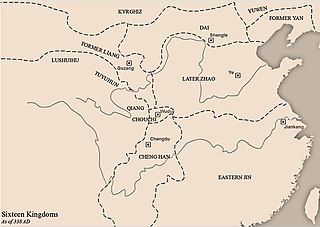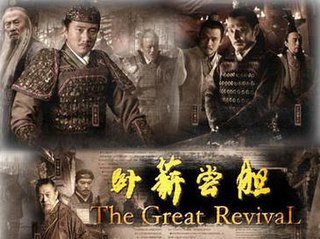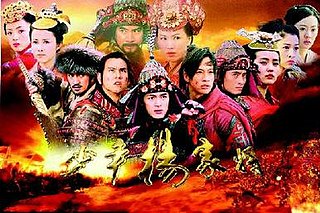
The Later Zhao was a dynasty of the Sixteen Kingdoms in northern China. It was founded by the Shi family of the Jie ethnicity. The Jie were most likely a Yeniseian people and spoke next to Chinese one of the Yeniseian languages. The Later Zhao was the second in territorial size to the Former Qin dynasty that once unified northern China under Fu Jiān.

Gagea is a large genus of spring flowers in the lily family. It is found primarily in Eurasia with a few species extending into North Africa and one species in North America.

Gagea serotina, synonym Lloydia serotina, is an Arctic–alpine flowering plant of the lily family. It is widespread across the mountainous parts of western North America, from Alaska to New Mexico, and in Europe is found in the Alps and Carpathians, as well as in Great Britain. It is also native to much of Central Asia, Siberia, China, Nepal, Mongolia, Korea and Japan.

Jade Goddess of Mercy or Goddess of Mercy is a 2003 film directed by Ann Hui, starring Zhao Wei and Nicholas Tse.

The Return of the Condor Heroes is a 2006 Chinese television series adapted from Louis Cha's novel of the same title. It is the second instalment of a trilogy produced by Zhang Jizhong, preceded by The Legend of the Condor Heroes (2003) and followed by The Heaven Sword and Dragon Saber (2009). It was first broadcast on 17 March 2006 in China and subsequently broadcast in other Asian countries such as South Korea, Taiwan and Singapore.

Romance of the Three Kingdoms is a Chinese television series adapted from the classical 14th century novel of the same title by Luo Guanzhong. The series was produced by China Central Television (CCTV) and was first aired on the network in 1994. It spanned a total of 84 episodes, each approximately 45 minutes long. One of the most expensive television series produced at the time, the project was completed over four years and involved over 400,000 cast and crew members, including divisions of the People's Liberation Army from the Beijing, Nanjing and Chengdu military regions. Some of the dialogues spoken by characters were adapted directly from the novel. Extensive battle scenes, such as the battles of Guandu, Red Cliffs and Xiaoting, were also live-acted.
The 6th National People's Congress was in session from 1983 to 1988. It held five sessions in this period.
The Politics of Henan Province in the People's Republic of China is structured in a dual party-government system like all other governing institutions in mainland China.

The China women's national volleyball team represents the People's Republic of China in international volleyball competitions and friendly matches governed by Chinese Volleyball Association. They are one of the leading and most successful squads in women's international volleyball, having won ten championships titles in the three major international competitions of volleyball, including five World Cups, two World Championships and three Olympic titles. The current head coach is Lang Ping.

Three Kingdoms is a 2010 Chinese television series based on the events in the late Eastern Han dynasty and the Three Kingdoms period. The plot is adapted from the 14th century historical novel Romance of the Three Kingdoms and other stories about the Three Kingdoms period. Directed by Gao Xixi, the series had a budget of over 160 million RMB and took five years of pre-production work. Shooting of the series commenced in October 2008, and it was released in China in May 2010.

The Great Revival, also known as Wo Xin Chang Dan, is a Chinese television series based on the conflict between the Yue and Wu states in the Spring and Autumn period. The Chinese title of the series is a Chinese idiom derived from King Goujian of Yue's perseverance in overcoming the odds to revive his fallen state of Yue and conquer the rival state of Wu. The series was first broadcast on CCTV-8 in mainland China in January 2007.
The Wei–Jie war was a conflict in northern China in 350 CE, during the chaotic Sixteen Kingdoms period. Following the fall of the Jie-led Later Zhao dynasty in 350 to the Han-led Ran Wei dynasty, tensions were high. The Jie people, who founded the Later Zhao, did not accept Ran Min's rule and rose against him; they were joined by many other dynasties established by the Five Barbarians that also opposed Ran Min. The resulting war ended with a decisive victory for Ran Min, who then proceeded to issue his famous "extermination order", which resulted in the extermination of virtually all of the Jie and most of the Wu Hu.

The Legend and the Hero is a 2007 Chinese television series adapted from the 16th-century novel Fengshen Yanyi written by Xu Zhonglin and Lu Xixing. The first season started airing on CCTV-8 in February 2007. It was followed by a sequel, The Legend and the Hero 2 in 2009.

China participated and hosted the 2010 Asian Games in Guangzhou on 12–27 November 2010.

The Young Warriors is a 2006 Chinese television series based on a series of novels and plays that detail the exploits of the Generals of the Yang Clan during the early Song Dynasty. The series was jointly produced by Chinese Entertainment Shanghai and Huayi Brothers Media Corporation, and stars an ensemble cast of talents from China, Hong Kong, Taiwan, the United States and Canada.

Ancient Legends is a Chinese television series based on the myths and legends associated with the origins of the Chinese civilisation. It is based on stories in Chinese mythology and the ancient classic Shan Hai Jing. The series was first broadcast in mainland China on CCTV-1 from 15 August – 6 September 2010.
Records of Kangxi's Travel Incognito is a Chinese television series revolves around the Manchu-ruling Qing Empire monarch Kangxi Emperor and the corruption he faces as he tries to make the government run efficiently. The series was directed by Zhang Guoli and produced by Deng Jie. The series consists of a total of 144 episodes shot in high definition, each 45 minutes long. The series is based on the events in the Kangxi era of the reign of Kangxi Emperor during the Qing Dynasty. The series also features Kangxi Emperor's family member and entourage in prominent roles and storylines, most notably his Concubine Yi and eunuch Sandezi and Buddhist monk Fayin, and Concubine Yi's servant girl Xiao Taohong. The program originally aired from 1998 to 2007, spanning five seasons and 144 episodes. For the first four seasons, the show starred Zhang Guoli and Deng Jie as Kangxi Emperor and Concubine Yi respectively. In the last season, John Lone and Irene Wan became the stars.
Gagea chinensis is a Chinese species of plants in the lily family, found only in the Inner Mongolia region of China.











